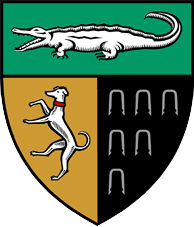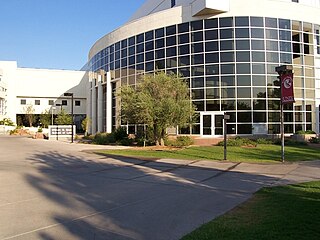
A law school in the United States is an educational institution where students obtain a professional education in law after first obtaining an undergraduate degree.

Wake Forest University (WFU) is a private research university in Winston-Salem, North Carolina, United States. Founded in 1834, the university received its name from its original location in Wake Forest, north of Raleigh, North Carolina. The Reynolda Campus, the university's main campus, has been located north of downtown Winston-Salem since the university moved there in 1956. The Atrium Health Wake Forest Baptist medical campus has two locations, the older one located near the Ardmore neighborhood in central Winston-Salem, and the newer campus at Wake Forest Innovation Quarter downtown. The university also occupies laboratory space at Biotech Plaza at Innovation Quarter, and at the Center for Nanotechnology and Molecular Materials. The university's Graduate School of Management maintains a presence on the main campus in Winston-Salem and in Charlotte, North Carolina.

Stanford Law School (SLS) is the law school of Stanford University, a private research university near Palo Alto, California. Established in 1893, Stanford Law had an acceptance rate of 6.28% in 2021, the second-lowest of any law school in the country. Since October 2023, Robert Weisberg has served as its dean.

Yale Law School (YLS) is the law school of Yale University, a private research university in New Haven, Connecticut. It was established in 1824 and is one of the most selective academic institutions in the world. The 2020–21 acceptance rate was 4%, the lowest of any law school in the United States. Its yield rate of 87% is also consistently the highest of any law school in the United States.

The Benjamin N. Cardozo School of Law is the law school of Yeshiva University. Located in New York City and founded in 1976, the school is named for Supreme Court Justice Benjamin N. Cardozo. Cardozo graduated its first class in 1979. An LL.M. program was established in 1998. Cardozo is nondenominational and has a secular curriculum, in contrast to some of YU's undergraduate programs. Around 320 students begin the J.D. program per year, of whom about 57% are women. In addition, there are about 60-70 LL.M. students each year. Cardozo was ranked 52nd in the nation by U.S. News & World Report in 2023, but 69th in 2024 due in part to various changes USNWR's calculation of rank.
The University of Pennsylvania Law Review, formerly known as the American Law Register, is a law review published by an organization of second and third year J.D. students at the University of Pennsylvania Law School. It is the oldest law journal in the United States, having been published continuously since 1852. Currently, seven issues are published each year with the last issue traditionally featuring papers from symposia held by the review each year. It is one of the four law reviews responsible for publication of the Bluebook. It is one of seven official scholarly journals at the University of Pennsylvania Law School, and was the third most cited law journal in the world in 2006.

The William S. Boyd School of Law is the law school of the University of Nevada, Las Vegas (UNLV) and the only law school in Nevada. It is named after William S. Boyd, a Nevada attorney and co-founder of Boyd Gaming Corporation who provided the initial funding for the school. The school opened in 1998 and graduated its first class in 2001.
The University of Illinois College of Law is the law school of the University of Illinois Urbana-Champaign, a public university in Champaign, Illinois. It was established in 1897 and offers the J.D., LL.M., and J.S.D. degrees.
The Chicago Journal of International Law is a semiannual, student-edited law review published by the University of Chicago Law School since spring 2000. The journal publishes articles covering international law, international relations, and related policy issues. Its articles are often interdisciplinary in focus, and the journal's format allows it to examine international legal issues in a broader cultural and political context. The Chicago Journal of International Law is one of the three student-edited law journals published at the University of Chicago Law School.
The Wake Forest Journal of Business and Intellectual Property Law is a student-run law journal produced by the Wake Forest University School of Law.

The Delaware Journal of Corporate Law is Widener University Delaware Law School's corporate law review. The Journal was established in 1975 and publishes three issues per annual volume. In addition to scholarly articles, the Journal publishes opinions from the Delaware Court of Chancery that are not otherwise printed in a regional reporter. In 2022, the Journal began including student authored case summaries as a preface to these opinions. It ranks among the top specialized legal journals in the United States based on the number of citations from federal and state courts. In 2008, the Journal ranked 10th out of 411 specialized journals based on citations in state and federal court opinions and 1st among student-edited journals in the category "Corporate Law and Business Law".
The Duke Law Journal is a student-run law review and the premier legal periodical of Duke University School of Law. The journal publishes general-interest articles and student notes in eight issues each year.
The Penn State Law Review is a law review and the flagship legal publication of Penn State Law. Its origins trace back to 1897 as The Forum, later renamed the Dickinson Law Review while affiliated with the Dickinson Law School, making it one of the oldest legal periodicals in the United States. When the Dickinson Law School merged with Penn State University in 2003, the name of the periodical was changed to the Penn State Law Review. Following the separation of the Penn State Law and Penn State Dickinson Law campuses into separately-accredited law schools in 2016, each school maintained separate law reviews; the name Dickinson Law Review was readopted by its respective law school, while the name Penn State Law Review was retained by Penn State Law.

The University of Missouri School of Law is the law school of the University of Missouri. It is located on the university's main campus in Columbia, forty minutes from the Missouri State Capitol in Jefferson City. The school was founded in 1872 by the Curators of the University of Missouri. Its alumni include governors, legislators, judges, attorneys general, and law professors across the country. According to Mizzou Law's 2016 ABA-required disclosures, 82 percent of the 2016 class obtained full-time, long-term, JD-required employment nine months after graduation.

The Wake Forest University School of Law is one of the professional graduate schools of Wake Forest University. Located in Winston-Salem, North Carolina, Wake Forest University School of Law is a private American Bar Association (ABA) accredited law school and is a member of the Association of American Law Schools (AALS). The school was established in 1894. The current dean is Andrew R. Klein.
The Washington and Lee Law Review is a law review published four times each year by the Washington and Lee University School of Law and founded in 1939. It presents lead articles contributed by leading scholars, judges, and lawyers, as well as student notes. Student writers are chosen during the summer after their first year of law school based upon grades and the results of a writing competition. Each staff writer develops a topic for original legal research, and writes over the course of the second year under the supervision of a faculty advisor and student editor. Selected writers continue as editors in the third year of law school.

The Journal of Corporation Law (JCL), at the University of Iowa College of Law, is the nation's oldest student-published periodical specializing in corporate law. It published its first issue in 1975. Its current adviser is Robert T. Miller, who joined the College of Law faculty in August 2012. The journal is routinely cited by scholars, practitioners, and courts, including the United States Supreme Court.
The George Mason University Civil Rights Law Journal is a law review run by students at the George Mason University School of Law. It published one or two issues each academic year from 1990 to 2006–2007, and three issues each year since then. The journal is published by William S. Hein & Co.
The Georgia State University Law Review is a law review edited and published by students at Georgia State University College of Law. In addition to scholarly articles, each fall the Law Review publishes a detailed legislative review of the activities of the Georgia General Assembly known as the Peach Sheets. The Peach Sheets serve as the state's only legislative history.










